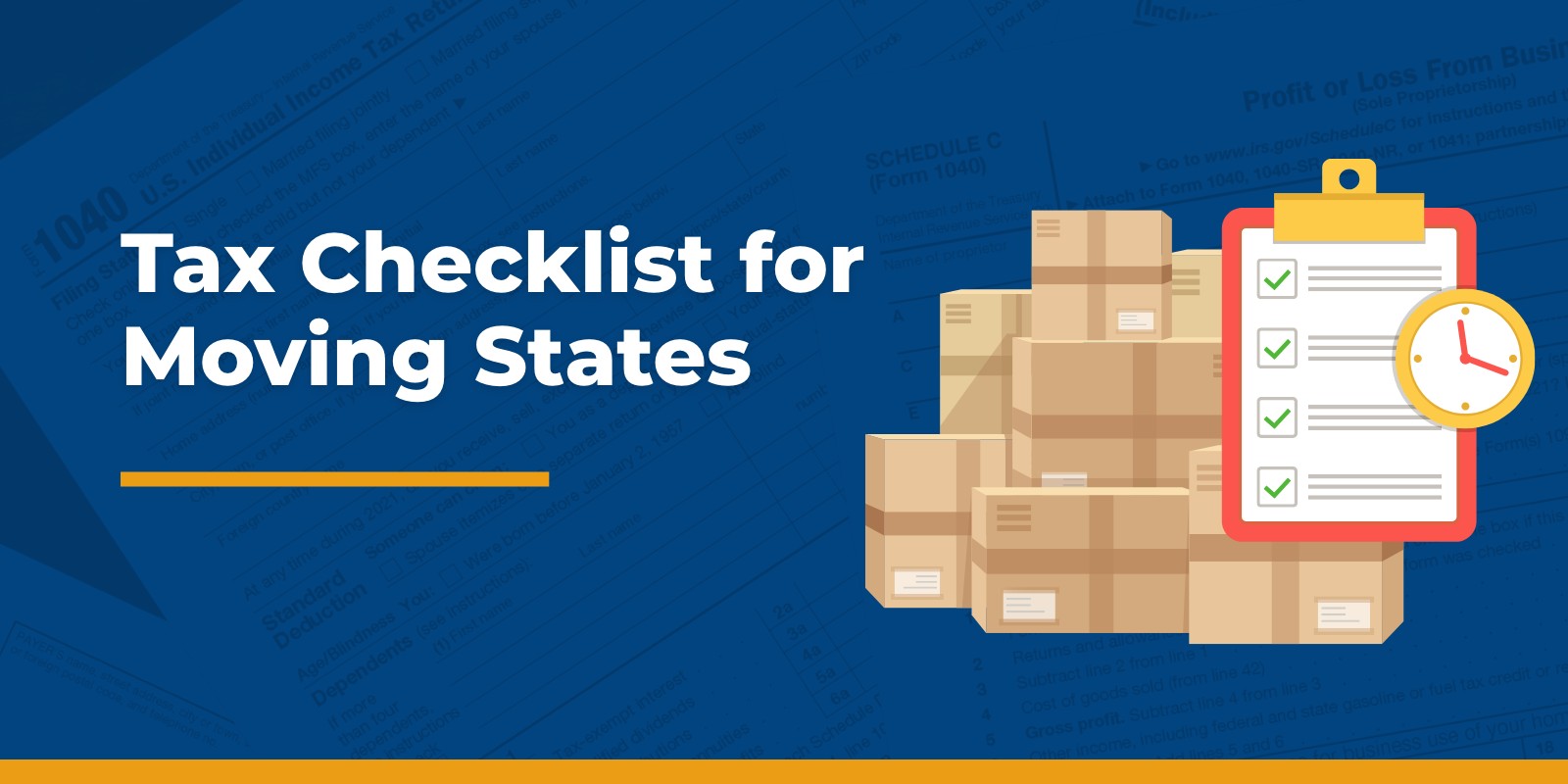Moving to a new state is often an exciting adventure, but amidst the hustle and bustle of relocation, it’s easy to overlook important details, such as how the move will impact your taxes. State tax laws vary widely, and failing to understand and plan for these differences can result in unexpected financial consequences. To help you stay ahead of the game, here’s a comprehensive tax checklist for anyone considering a move to a different state.
Check the Income Tax Rate
When researching where to move, finances are sure to be a top priority to keep in mind. Sometimes this means choosing a state that has a lower cost of living. Another thing to consider is the state income tax rate. Certain states do not tax any income. These include:
- Alaska
- Florida
- Nevada
- South Dakota
- Texas
- Tennessee
- Washington
- Wyoming
New Hampshire does not tax W-2 wages but does tax certain investment and business income. However, this tax will be eliminated in 2025. California, Hawaii, New York, New Jersey, Oregon and Minnesota currently have the highest income tax rates.
Check Property Tax Rates
Property tax rates can vary widely from state to state, and even within states, they can vary by county or municipality. It’s essential to research the specific property tax rates in your new location to accurately budget for homeownership expenses. Some states, like New Jersey and Illinois, are known for having particularly high property tax rates. Others, such as Hawaii and Alabama, have comparatively lower rates. Before purchasing a home in your new state, research recent property sales in the area to get an idea of the market value and potential property tax implications.
High property tax rates can impact the affordability of homeownership. This is especially true for those on fixed incomes or with limited financial resources. When considering a move to a new state, factor in the property tax implications alongside other housing-related expenses, such as mortgage payments, insurance, and maintenance costs. Property taxes are generally deductible on federal income tax returns, subject to certain limitations. However, the deduction for state and local taxes, including property taxes, is capped at $10,000 per year for individuals or married couples filing jointly.
Check Sales Tax Rates
Sales tax rates are another critical consideration when moving to a new state, as they can impact your day-to-day spending habits and overall cost of living. Sales tax rates can vary significantly from state to state and even within states. While some states have a single statewide sales tax rate, others allow local jurisdictions to impose additional sales taxes, resulting in varying rates within the same state.
Certain goods and services may be exempt from sales tax in some states. Common exemptions include groceries, prescription medications, and clothing. Additionally, some states impose special sales tax rates on specific items, such as gasoline, alcohol, tobacco, and prepared meals. Be aware of these special rates and how they may impact your budget. Sales tax rates can have a significant impact on the overall cost of living in a particular state. Higher sales tax rates may make goods and services more expensive, reducing your purchasing power and impacting your budget. When considering a move to a new state, factor in the sales tax rate alongside other cost-of-living expenses.
Check Your Filing Requirements
If you lived in two or more states during a year, you would need to check the filing requirements for each state. The requirements are typically listed on the state’s tax authority website. In most cases, you’ll need to file a return in all states you lived in during the tax year. To do this, you’ll need to calculate your earnings in each state and determine the percentage of your income that was earned in each state. You’ll need to file the relevant tax forms in each state, usually as a resident or part-year resident. It’s important to note that two different states legally cannot tax the same income, so moving states does not necessarily mean you will pay more taxes.
There may be some scenarios in which you moved states, but still work in your old state. In this case, you would likely need to file a tax return in the state where you live, as well as a nonresident tax return in the state where you work. You may also want to check the tax laws in your new state. Finding out how your new state handles itemized deductions, state tax deductions, or federal tax changes can help you avoid unexpected issues during tax time.
Check Which Income Types Are Taxable
If you have multiple sources of income, it is vital to check how the income will be taxed in your new state. Interest and dividend income is typically taxed by the state in which you are a permanent resident. In addition, some states require estimated tax payments on some incomes. Not knowing the rules or deadlines for these can result in underpayment penalties.
Investments that are tax-exempt in your old state may suddenly be taxable in your new state. While all states do not require you to pay taxes on federal bonds, not all states have the same definition of a federal bond, meaning some tax bonds and others do not. Retirement income is also taxed differently in certain states, so if you are moving because of retirement, you may want to check the tax laws surrounding retirement income first.
Check Your Eligibility for Moving Expense Deductions
The 2017 Tax Cuts and Jobs Act (TCJA) eliminated the moving expense deduction for taxpayers, unless they are active-duty military members. However, this act is set to expire beginning in 2026.
Tax Relief for Those Moving States
It goes without saying that filing taxes after moving states can become very complex, especially if you have several income sources. Sometimes the new state you move to may not be your first choice, like when you’re an active-duty military member or are relocating for a job. In other cases, you may have the option to choose which state you want to relocate to. In these cases, researching tax laws in your new state can save a lot of time, money and stress during tax time. It may be best to seek the help of a credible tax preparer or professional to look at your tax situation. Optima Tax Relief has a team of dedicated and experienced tax professionals with proven track records of success.
If You Need Tax Help, Contact Us Today for a Free Consultation
Publisher: Source link











